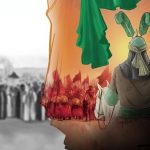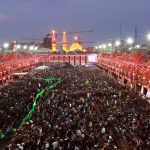
The Day of Arbaeen marks forty days after the Day of Ashura, the day Hussain ibn Ali was martyred in the Battle of Karbala. Hussain ibn Ali was a 7th century revolutionary leader who sacrificed his life for social justice.
The arabic word ‘Arbaeen’ (pronounced Arr-ba-een) translates to forty (ie fortieth day). The traditional period of mourning in Islamic culture is forty days. Millions of people around the world mark the Day of Arbaeen by mourning the tragedy that befell Hussain ibn Ali, his family and his companions.
The arabic word ‘Arbaeen’ (pronounced Arr-ba-een) translates to forty (ie fortieth day). The traditional period of mourning in Islamic culture is forty days. Millions of people around the world mark the Day of Arbaeen by mourning the tragedy that befell Hussain ibn Ali, his family and his companions.
The Day of Arbaeen, today
Today, almost 1400 years later, the Day of Arbaeen is mourned by millions of people around the world. It is marked as a day to pay tribute to the sacrifice of Hussain for social justice. Typically, on this day people organise large marches in cities across the world to symbolise the eternal nature of Hussain’s revolution and to show they stand for social justice, honour and peace.
In recent years – after the fall of the Saddam regime – a tradition of walking 80km from Najaf (the resting place of Hussain ibn Ali’s father) to Karbala has been reignited. Every year since, the number has been rising steadily from 17 million pilgrims to at least 25 million. People from all walks of life and all corners of the globe make the journey, despite the imminent threat of terrorists who have vowed to attack the pilgrims.
Along the 80km stretch from Najaf to Karbala volunteers distribute free food and drinks to those undertaking the pilgrimage, as well as offering places to relax, wash and sleep. Arbaeen Day is now the largest annual peaceful gathering in the world, with numbers set to increase significantly every year.
Source: whoishussain.org










